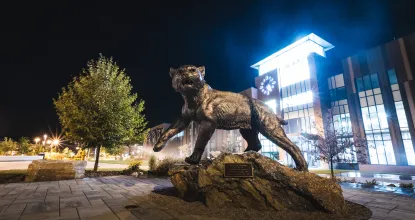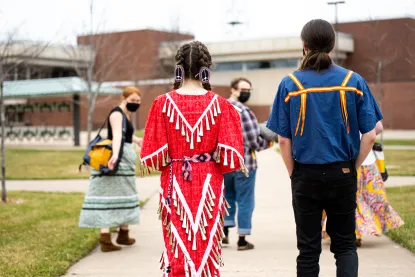
Mino-bimose'idiwag (Walking the Path Together)
The Social Work Department and the Center for Native American Studies, in conjunction with the Walking the Path Together (WPT) project, seek to support and connect interested students with rural tribal communities for internship placements.
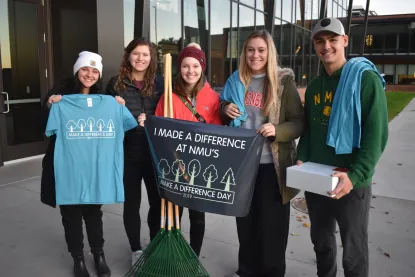
Be A Volunteer
One of the best ways to prepare for a career in social work is to get involved in your community and be a volunteer. Volunteering provides a necessary service, and volunteers gain a great deal of satisfaction from knowing that they have made a difference in the lives of others.
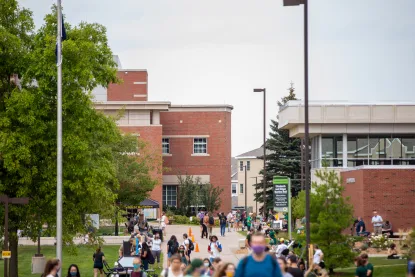
Join A Student Organization
The Student Social Work Organization (SSWO) is a group of students primarily majoring in Social Work who value spending time with others and coming together through involvement in community service activities. Anyone is welcome to join the fun!

Study Abroad with NMU Social Work!
Gain a global perspective on current topics in social work and beyond while studying abroad!
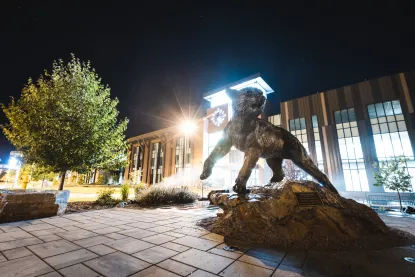
BSW Student Savannah Stein shares the journey to Social Justice
BSW, Savannah Stein shares how one project in Community Organizing, helped her discover her passion for Social Justice and Equality for all
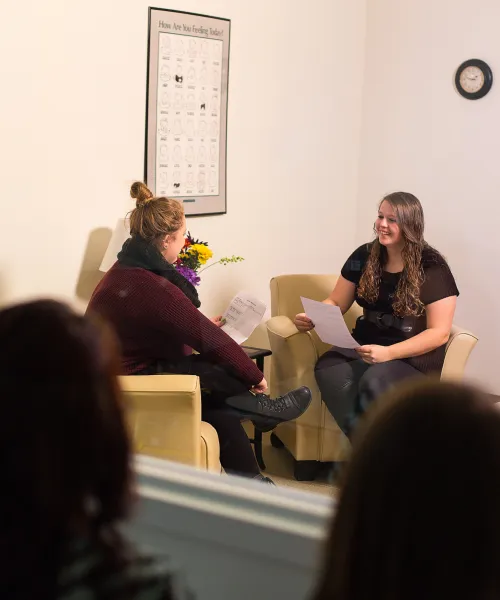
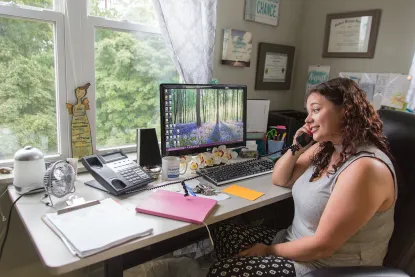
Gain Work Experience
What can you put on your resume when you apply for a professional job or graduate school? In addition to your BSW degree, work experience is invaluable. The following agencies have provided excellent opportunities for students in the local area.
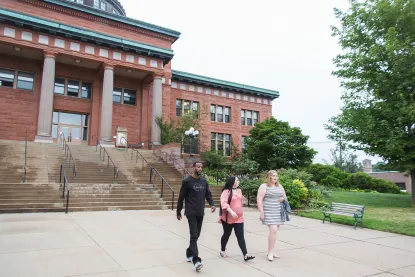
Career Diversity
The social work profession provides a wide array of professional employment opportunities. Some of the major fields of practice for social workers include mental health, medical health, child welfare, family services, aging, and more.
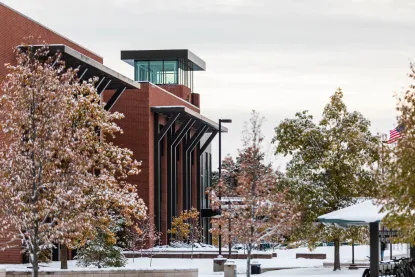
Licensing and Certification
The purpose of licensing and certification in social work is to assist the public through identification of standards for the safe professional practice of social work. Each state defines by law what is required for each level of social work licensure. Typically, there are four categories of practice that states may legally regulate.
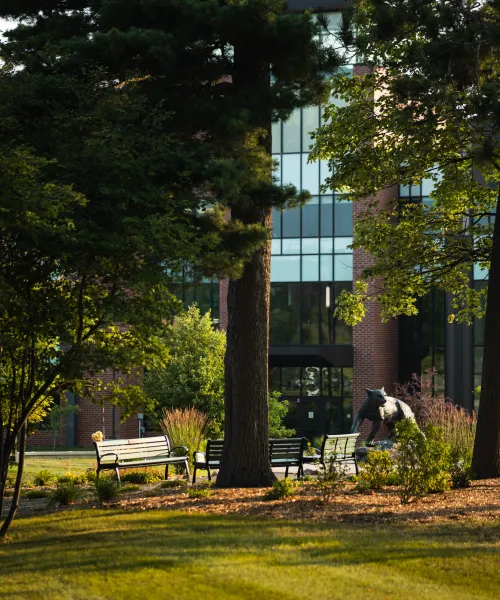

Certification for Substance Abuse Counselors
Students who are completing a BSW, and who have an interest in substance abuse treatment should complete a field placement in a substance abuse treatment setting, and complete the Substance Abuse Minor or at least some addictions-related courses.
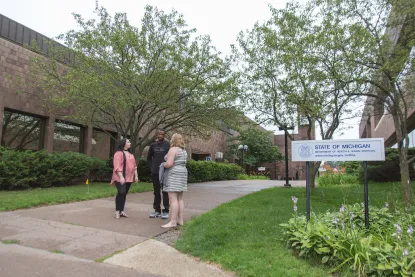
Professional Employment
Even if you're just thinking about a career in social work, exploring these links can give you an idea of the range of social work positions available, the credentials required and the salaries offered.
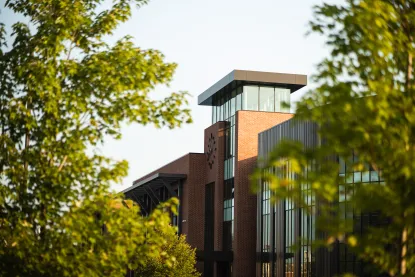
Graduate School Options
Several distance education MSW programs are now available. CSWE provides a list of distance education MSW programs. [Note: Many have restricted service area and may not serve the U.P.] In recent years, NMU BSW grads have completed MSW degrees here in the Upper Peninsula through one of the following program
More Information
The Social Work Department and CNAS, in conjunction with the Walking the Path Together (WPT) project, seek to support and connect interested students with rural tribal communities for internship placements. The programs also seeks to advance education in Native American Studies and work with victims of crime in Indigenous communities with an emphasis on Great Lakes Indigenous perspective.
Is there a need? Yes.
Retaining qualified victim advocates in rural reservation communities is immensely challenging.
Domestic violence programs are seeking to place skilled and caring advocates in rural Indigenous communities. Successful advocates will embody cultural humility and engage in culturally inclusive approaches.
Addressing the Challenges:
The three key challenges addressed through the WPT are:
| The rural nature of the region creating distance between tribes and major universities with accredited programs. | The importance of remaining connected to communities of origin for Native American students | Financial barriers exacerbated by poverty and economic disparities that are endemic in rural Native American communities. |
WPT Interns and Fellows will:
| Understanding the challenges and engaging in cultural humility are both required for meaningful advocacy work. |
- Continue to grow their interpersonal and communications
- Foster positive connections in their community through collaboration with clients, other employees at the agencies, and their fellow interns
- Demonstrate effective and reflective writing
- Collaboratively design and complete a practical learning plan with the support of their agency supervisor and instructor
- Develop and enhance cultural humility and sensitivity with Indigenous communities.
WPT Benefits:
| Undergraduate Students | Advanced BSW & MSW | Everyone |
| Undergraduate students can enroll in a summer course and a 96-hour paid mini-internship. These students will complete a summer course while placed in a tribally run victim services program located within an Indigenous community throughout the Upper Peninsula. | MSW first-year and BSW advanced-year students may apply to the Walking the Path Together Social Work Fellowship, in which they will complete a 400 hour field placement with a tribal victim-services agency. Individual students will be awarded up to $3000 per semester to support the costs associated with completing the internship program. | WPT will host professional development workshops for students and regional professionals, provided by qualified and established consultants. Regional tribal victim service agencies will be able to share opportunities to recruit NMU students for field placements or employment. |
Contact Us
| Social Work Department | Center for Native American Studies |
| 2400 Suite Jamrich Hall | 112 Whitman Hall |
| 906-227-1105 | 906-227-1397 |
| wpt@nmu.edu | cnas@nmu.edu |
Land Acknowledgment
Northern Michigan University is located in beautiful Marquette, Michigan, upon the ancestral homelands of the Anishinaabe Nation. Anishinaabe people are among the First Peoples of the Great Lakes. Marquette is known to the Anishinaabe as Gchi-namebinin Ziibing, which refers to a life-sustaining river.
Special thanks also to the Hannahville Indian Community, Bay Mills Indian Community, Keweenaw Bay Indian Community, and Sault Ste. Marie Tribe of Chippewa Indians.
Current Volunteer Opportunities:
Attention Social work, Psychology, and Education students!
MDHHS is hosting a seminar at NMU’s Northern Center on Oct 21 this year for our foster parents across the UP. They will need assistance in providing childcare during the seminar. The seminar will tentatively be held from 8:00am-4:00pm and we are looking into options for providing childcare for the attendees. If interested, students would need to provide some personal information to have background checks done to ensure the safety of the children. Supplies for activities will be provided in addition to lunch paid for by MDHHS.
This opportunity would contribute to SW100 volunteer hours.
To volunteer, reach out to Brooke Mleko who is a child welfare analyst. (906) 235-9771.
One of the best ways to prepare for a career in social work is to get involved in your community and be a volunteer. Volunteering provides a necessary service, and volunteers gain a great deal of satisfaction from knowing that they have made a difference in the lives of others. Becoming a volunteer can:
1. help you decide whether social work is really the profession for you.
2. help you decide what populations you may or may not want to work with.
3. develop your skills and help you retain textbook knowledge.
4. give you experience to include on your resume.
5. boost your confidence
6. enhance your own comfort with diverse groups.
How Do You Get Started?
There are many opportunities to volunteer in Marquette and the surrounding area. For NMU students we suggest that you begin with:
- NMU Volunteer Center - The organization is part of the Center for Student Enrichment. This office coordinates all of the volunteer opportunities for NMU students in conjunction with the Marquette County Volunteer Center.
- Child and Family Services of the Upper Peninsula (906-226-1516) - Child and Family Services is one of the Upper Peninsula is one of several Northern Michigan Private Child and Family Service agencies. They offer several opportunities for volunteers, including:
- "The Success Partners" is a mentoring program for high-risk youth who have multiple risk factors. Volunteers are asked to commit three hours a week to a youth. In return they are paid $20.00 a session, paid mileage, and also reimbursed for activities such as bowling or movies.
- "The Before & After School Program" recruits volunteers who may play with or do homework with children before and after school in several schools in the county. Last year this program served 500 area children. Volunteers are considered role models for the children who are, also, asked to participate in volunteer activities in the area. The children rake leaves and plant bulbs in the local school yards.
- Lutheran Social Services (906-226-7410) - This agency uses volunteers in a variety of ways but particularly with the homeless youth programs. They use volunteers to help facilitate Life Skills classes in the alternative high school, to plan and organize fund raising and recreation activities with youth, to chaperone dances or to work with children in a low income housing area. They also use volunteers in the Transitional Living House to visit with drop-in youth and to help in the pantry. These programs reach youth in four other counties and volunteer experiences are available in those counties.
- Michigan Department of Human Services (DHS was formerly the Family Independence Agency) (226-9691) - Volunteers transport clients to medical appointments, bring them to treatment or residential centers, do clerical work, or supervise parent visitations. There are DHS agencies in every county. Click on "County Offices" link on DHS Web site to locate one near you.
- Pathways to Healthy Living (formerly Community Mental Health) For more information call: Community Relations Office: 906-233-1288 or 1-888-728-4929 extension 31288 - Pathways is a multi-county agency serving Marquette, Delta, Alger and Luce Counties. Pathways' primary service populations are the mentally ill and the developmentally disabled. They run a wide array of services; a volunteer experience at Pathways is an excellent supplement to your formal education.
These are just a few of the various agencies that utilize volunteers. You can generally find a volunteer experience to suit your interest. If you reside outside the Marquette County area, you should be able to find similar opportunities through a local volunteer center or social agency similar to those listed above.
The social work profession provides a wide array of professional employment opportunities. This page provides a brief overview of the many kinds of social work jobs. The Encyclopedia of Social Work lists 50 different problems areas frequently experienced by persons in our society. The profession of social work offers a wide range of services to meet these needs. The many career options in social work can be roughly organized into fields of practice.
A field of practice describes a group of practice settings that deal with similar client problems. Each field may have numerous agencies (settings). Social work has the unique ability to change jobs with radically different duties, yet the practitioner can still be referred to as a social worker.
The following 13 categories are considered the major fields of practice for social workers:
1. Mental Health Services
Approximately 40% of all employed social workers work in this area. This includes both inpatient and outpatient services. It also includes work with the mentally ill, as well as those clients with developmental disabilities. Of the 40% employment, approximately one-third have their MSW degree, while approximately 10% have BSW degrees.
2. Medical Health Care
Approximately 18% of all employed social workers represent the health care field. This includes work in hospitals, health clinics, home health, and with private physicians. The large majority of these social workers have their MSW degree.
3. Child Welfare
This field of social work may be the oldest field represented. Approximately 15% of all employed social workers are in areas of adoption, foster care, residential care, protective services, and home support (daycare and/or homemaker services). There is also a good mix of BSW and MSW level social workers in this field.
4. Family Services
Most people might be surprised that the primary profession that deals with family issues is social work. Approximately 11% of all employed social workers are in this area. This includes counseling (casework, group work, therapy), family life education (preventive services), and family planning (issues of reproduction, contraception, and abortion).
5. Aging
For over 50 years, the U.S. has been preparing for an aging society. The number of Americans age 55 and older will almost double by 2030 – from 60 million today (21 percent of the total US population) to 107.6 million (31 percent of the population).
By most accounts, careers in aging are going to be among the next big things in the 21st Century workplace. Equal challenge and opportunity exists for students of gerontology, and those academic institutions and other workforce entities that train them for these new careers in aging. Job opportunities can be found in a number of settings, and span the wide breadth of the long-term care continuum. This continuum includes working with older adults in their own homes, in an array of community-based services, as well as in long-term care environments such as assisted living and nursing homes. Social workers in the field of aging are employed by hospice organizations, hospitals, senior centers, adults day care and intergenerational programs, assisted living facilities, nursing homes, and planning agencies such as Area Agencies on Aging.
6. Schools
Approximately 3% of all employed social workers function in school settings. Most have their MSW degrees. There is great variability of school employment for social workers, depending on the state in which the worker is employed. Some states may require teaching certificates, while other states may hire depending on the ratio of students to worker. Individual, group, and family counseling are common treatment modalities here.
7. Substance Abuse
The statistic of 3% may appear small, as many social workers in this field may actually get counted in the general health care services. A good mix of BSW and MSW level workers are included here. Settings may include hospitals, group homes, and other residential facilities. Often the social worker is also required to obtain a CAC (Certified Addictions Counselor). Much group therapy is done in programmatic settings.
8. Income Maintenance
Approximately 2% of all employed social workers are in this field. Generally, this field can be divided into two categories: Public welfare and Social Insurances. Public welfare services may include AFDC, food stamps, general assistance programs, and supplemental security income. Social insurances include such programs as Social Security, Medicare, unemployment insurance, and workman’s compensation. Along with the field of aging, this is the largest area for BSW level workers.
9. Corrections
Almost 2% of employed social workers are in the area of corrections. Due to the increase of prisons, however, this number may be on the rise. Various levels of prisons, jails, and probation services are common settings in this field. Since a degree in Criminal Justice is more specific to this area, a social worker may find this to be a unique setting in terms of environment and philosophy, possibly even contradictory to social work training. However, the potential here is expanding.
10. Education and Training
Due to extensive educational requirements, only 1% of social workers represent this field. Whereas the MSW used to be considered the terminal degree in this profession, now more programs offer Ph.D. and DSW degrees in social work. Consequently, most universities now require a doctoral degree in social work or a related field in order to teach. Still, many experienced MSW practitioners continue to teach in tenure track and adjunct positions.
11. Occupational Social Work
This field includes work in major corporations and private practice settings. Direct services may be provided to employees, consumer groups, and management. Contract consultative services are often utilized here. Although the percentage of social workers employed here is less than 1%, this number may rise due to increased opportunities, stricter licensing laws, and third-party reimbursement.
12. Group and Youth Services
This field includes such settings as Boy/Girl Scouts, Camp Fire, YMCA, YWCA, and various agencies under the umbrella of United Way. Less that 1% of social workers are employed in such settings, as traditionally, a specific social work degree has not been required. More BSWs work in this field than MSWs, although the latter perform contract and consultation work at times.
13. Neighborhood and Community Services
This last field also represents less than 1% of employed social workers. It also is the best field that represents macro social work. This field has a long history, dating back to the turn of the 20th century with Jane Addams. Organizational skills, planning skills, and analytical development skills are required tools here. Persuasive speaking and advocacy become important skills as well. This field is a good example of "the sociology of social work."
BSW Program
The following materials are also available from the department secretary. Assuming that you are using a computer provided by NMU or another computer with equivalent software, you should be able to download these forms, complete them and print them.
Advising Package - Especially useful for new or prospective students, this set of materials outlines the curriculum and helps you develop a plan of study. Includes guides for transfer students.
Curriculum Planners - Use these forms to keep track of requirements that you've completed and to determine which courses to take next. Download and use to keep an updated requirement
Note: All BSW must be signed by the student's advisor. Applications without advisor signatures will not be accepted.
BSW Program Application - All BSW majors must complete an application for the advanced curriculum at least one semester prior to enrolling in SW 370 and SW 372. The form is available from the department secretary or use the link to download the form and complete it as an Adobe Acrobat file. The form should be first discussed and submitted to the student's advisor for their signature, and can then be emailed to the Program Director, Ann Crandell-Williams, or turned in to the department secretary.
BSW Field Placement Application - All BSW majors must complete a field placement application supplement prior to being placed for their required field study. The form is available from the department secretary or use the link to download the form and complete it as an Adobe Acrobat file. The form should be emailed to Program Director, Ann Crandell-Williams, or turned in to the department secretary.
MSW Program
MSW Program Application - All MSW applicants must apply through the NMU Graduate School Application. Early admission applications are due by December 1 and regular admission applications are due by February 1. Student must submit a Personal Statement, transcripts, and three letters of recommendation along with a completed application.
MSW Generalist (1st Year) Field Placement Application or MSW Concentration (Year 2 or Advanced Standing) Field Placement Application -
Field placement applications must be downloaded, completed and turned in upon admission the the program. Student who will have obtained a BSW prior to program admission to the Regular Standing option will also be required to submit a Supplemental Field Portfolio with their field placement application. (Students admitted under Advanced Standing will not be required to submit the portfolio). Please email placement applications to Field Coordinator.
Finding An MSW Program
The Council on Social Work Education (CSWE) is probably the best starting point for locating information on graduate education in social work. The Council's Web site has links to all accredited MSW Programs in North America.
MSW Options in the Upper Peninsula
Several distance education MSW programs are now available. CSWE provides a list of distance education MSW programs. [Note: Many have restricted service area and may not serve the U.P.] In recent years, NMU BSW grads have completed MSW degrees here in the Upper Peninsula through one of the following programs:
Northern Michigan University—NMU's MSW program is one of the most affordable schools with a wide array of field placement opportunities across the Upper Peninsula and a flexible global campus option for distance students. This program offers options for clinical or macro concentration for an education that meets students' individual career interests and learning needs.
University of North Dakota—This school has been charging resident tuition, so it is one of the more affordable options. Classes feature live instruction; student complete field placement here in the U.P. Perhaps the distance education option in the U.P. at the present time.
University of New England—A private school, so it is more expensive, but it does offer a distance education option that permits students to complete the MSW locally.
Grand Valley State University—has offered their program as a distance education option at Lake Superior State University in Sault Ste. Marie, MI. The program requires travel to LSSU for classes. Last class graduated 2008.
Michigan State University –offers a “blended clinical” program that involves on-line courses with participation in a local cadre of students. The program has required post BSW social work employment experience in the past.
Making the Decision
Making the decision to enter the labor market as a social worker after graduation or going on for further education is a personal choice. No choice is the wrong one; each individual’s life circumstances vary and influence this decision.
Benefits of Employment Prior to Graduate School:
- having an income; utilizing the education one worked hard to get;
- gaining professional experience and making professional contacts;
- gaining exposure to working within a particular field of practice;
- having professional experience as a resource base upon entering graduate school;
- developing sense of self and community.
Benefits of Entering Graduate School:
- motivation to continue schooling making transition less abrupt;
- familiarity with demands required of a student;
- being current with changing technology in academia;
- establishing professional contacts;
- better long-term earnings potential;
- greater job flexibility and expanded therapeutic intervention strategies;
- option to do solo practice or function in an administrative position
Preparation for Graduate School: Every graduate program has specific requirements for admission. One might require a certain test such as the Graduate Record Exam (GRE), while another may not. Universally, MSW programs will ask the student to provide a narrative statement regarding their interest in pursuing a career as a professional social worker or pose a series of questions to be answered by the prospective student. Generally, three letters of reference need to be obtained from individuals familiar with the student in differing contexts such as a college professor and an employer. Grades are important for acceptance purposes and maintaining at least a 3.0 in undergraduate is highly desirable. Some schools may offer an advanced standing program. Admission to advanced standing programs is competitive and most school require a 3.25 grade point average.
Planning for graduate school needs to begin early. Some schools only accept students once a year, while others admit on a more flexible basis. Either way, applying to grad school is time consuming and includes some expense. Schools vary in terms of the concentration areas offered. The student will save time and money by first investigating a number of schools, then identifying several schools that have the specialization areas that are of interest such as: administration, community planning and development, specific practice area of interest, research and the like. Think big when making application to graduate school; do not rule out a particular school because of its reputation and requirements. Schools like University of Michigan or the University of California at Berkeley, well known for their rigorous academic programs, are likely to have significant financial aid packages as well as scholarships. Like anything else, the more thorough one is in the initial phases of scouting out graduate programs that seem to have a good fit, the more satisfied the student will be with the final outcome.
Each school will have its own financial aid programs. Many offer teaching and/or research assistantships that defray the cost of education. Due to the changing demographic factors impacting who today's college students are likely to be, many MSW programs are offered on a part-time basis, via long-distance education or as Web-based courses
 |
|
NMU BSW Alumni Jackie Olson |
Are there jobs in this field? What’s it really like to work with A BSW degree? What can I expect by way of salary and benefits? These are common questions that we hear from current and prospective students. Although you will find many answers to these questions in the Students section of this website, there's nothing like hearing from graduates themselves and learning from their experiences. So, instead of just giving you the official facts, we’ve been asking alumni to tell you about their experiences in their own words. Here are the stories submitted by some of our most recent graduates. More will be added as they become available. So, if you are a graduate of the Department of Sociology, Social Work and Anthropology yourself and would like to share your story, please e-mail the Department at sosw@nmu.edu
Kaytee (Alderton) Riley May 2009 Adoption Worker and U of M MSW student
Allison Stefaniak, December 2008 Family Support Specialist
Katie VanderVeen, May 2008 Americorp NCCC volunteer
Katreena Hite, May 2007 Kansas Department of Social & Rehabilitation Services
Chuck Mersnick, May 2007 Veterans Peer Support Specialist
Jacqueline Olson, May 2007 Child Protection Services
Ryan Nettesheim, May 2006 Life Skills and Independent Living Specialist
The purpose of licensing and certification in social work it to assist the public through identification of standards for the safe professional practice of social work. Each state defines by law what is required for each level of social work licensure. Typically, there are four categories of practice that states may legally regulate.
BASIC: Baccalaureate social work degree upon graduation.
INTERMEDIATE: Master's degree in social work (MSW) with no post-degree experience;
ADVANCED: MSW with two years post-master's supervised experience; and
CLINICAL: MSW with two years post-master's direct clinical social work experience
Social work degrees must be obtained from programs of social work that are accredited by the Council on Social Work Education (CSWE) or other nationally recognized accrediting agencies. Non-social work degrees are accepted in some instances at the Basic level. Some states regulate only one of these practice levels, while most states regulate two or more levels of social work practice.
Association of Social Work Boards This is one of the best sites for summary information and links to licensing information throughout the country.
Social Work Examination Services has been a leader in providing on-site review courses and home study programs specifically designed to prepare social workers for license examinations throughout the United States. Their web-site provides links to most state boards.
-
BSW Level Social Work Licensure in Michigan
-
Certification for Substance Abuse Counselors
The following links are suggested for locating social work employment. Even if you're just thinking about a career in social work, exploring these links can give you an idea of the range of social work positions available, the credentials required and the salaries offered.
The Academic and Career Advisement Center at NMU is a good place to begin exploring career options.
Career Services is another important on-campus resource for getting you on your way to locating professional employment. In addition to job listings, you'll get assistance with preparing a resume and advice on conducting a job search.
Some human service organizations post position vacancies on their own Web sites. Try these local and regional employers:
- Northcare Upper Peninsula regional organization with links to mental health centers across the U.P.
- Pathway Community Mental Health Pathways is a multi-county community health agency serving Marquette, Delta and Luce Counties.
- U.P. Health System
- Teaching Family Homes of Upper Michigan--This organization provides a variety of child welfare services such as group homes throughout the Upper Peninsula.
- Child and Family Services of Upper Michigan--This agency has adoption, foster care and other child and family services throughout the Upper Peninsula. Their page also has links to other Child and Family Services agencies throughout Michigan.
- Great Lakes Recovery--is a substance abuse treatment organization with offices throughout Michigan in addition to their facilities in Marquette.
Employment information for people with disabilities is available from the Social Security Administration.
The Michigan Career Builder is a web site operated by the Detroit News. It often carries job information on positions throughout the state. Browse this site to get an idea of the diversity of social work jobs and typical salary levels.
Illinois Chapter of NASW site provides information and links to employment sources in Illinois.
Michigan Chapter of NASW has a limited listing of job openings in our state. The Web-site is relatively new and should provide more listings in the future.
Michigan Community Health This web site does not have employment listings, but it does provide information about community mental health and substance abuse services in Michigan. You can also get a list of community mental health agencies in Michigan and contact them directly regarding possible openings.
Michigan Civil Service Department is the source for state civil service career information.
Minnesota Department of Human Services. This site provides access to social work related positions throughout Minnesota as well as other employment opportunities under the state merit system. The Hennepin County site is a good web site for the Twin Cities area, including Minneapolis, St. Paul, and surrounding communities.
National Association of Social Workers (NASW) publishes a monthly newsletter for members. NASW also maintains NASW Job Links, an on-line service for social work positions. Many of these positions require an MSW degree, but it's worth checking out this site, especially for exploring future career possibilities.
The New Social Worker On-Line Career Center The New Social Worker is a social work student organization. Their site includes a wide variety of links to social work employment Internet sites.
Social Service .com advertises itself as the place to begin your career search. It does provide information on a broad range of human service related employment.
State of Wisconsin Department of Employment Relations Opportunities for Wisconsin civil service jobs can be found at this site.
If you started your college career at another institution and plan to transfer to Northern Michigan University, we have information to ease your transition.
The NMU Registrar provides information on course equivalencies between NMU and many other colleges. Requirements change and you may need to consult with the NMU Registrar and social work program director for the latest information. In some cases, there may be no direct equivalency between courses at your current school and NMU, but course substitutions may be allowed. Students should check such arrangements carefully before enrolling in nonequivalent courses.
The following NMU courses that are required by the BSW Program have been frequently offered as Web-based offerings. Although availability varies from term to term, students who are planning on relocating to NMU for the BSW Program may be able to get a jump-start by completing one or more of these Web courses to meet program requirements.
- SW 100 Exploring Social Work, 4 credits
- SW 230 Human Behavior and Social Environment I, 4 credits
- SW 308 Research Methods II, 4 credits
- SW 331 Human Behavior and Social Environment II, 4 credits
- SO 372 Minority Groups (formerly SO 282), 4 credits
The Social Work Advisement Package includes specifics to help potential transfer students select courses to make efficient use of resources at their current school.
See Transfer Admissions for more information about university requirements and becoming a part of the BSW Program at NMU.
What can you put on your resume when you apply for a professional job or graduate school? In addition to your BSW degree, work experience is invaluable. It's common for professional positions to be advertised internally before making general announcements. Many of our BSW graduates secure professional jobs in the same agencies where they worked or volunteered prior to graduation. Many students want to work or need to work in order to continue their education, so why not combine your need for income with professional enhancement? The following agencies have provided excellent opportunities for students in the local area. Similar organizations are available in other communities.
- Marquette County Youth Home (225-1437) - This is an unlocked residential center for children who have been or are in the process of being adjudicated and need an environment slightly more restrictive than their own homes. Not only do the workers work at the youth home but they are employed as in-home detention workers and as transporters for the juvenile court. They hire social work students or other student in human service field who have at least 30 college credits as child care workers. The youth home is administered through the Marquette Probate Court.
- Great Lakes Recovery Youth Treatment Center (906-228-9699) - Great Lakes is a residential treatment center for adolescents who are chemically addicted. They frequently hire part-time staff and like to hire students.
- Lutheran Social Services (906-226-7410) - LSS is a multi-service agency that employs care providers who assist at the transitional living house in the pantry and the drop-in center.
- Adult Learning Systems (906-226-6178) - This agency operates two residential centers for adults who are mentally challenged. They hire direct care workers.
- Pathways to Healthy Living (formerly Community Mental Health) For more information, call the community relations office at 906-233-1288 or 1-888-728-4929, extension 31288. This community mental health agency primarily serves the mentally ill and developmentally disabled populations and their families. They typically employ people in positions such as aids, life skills technicians, and transporters.
- Life skills technicians work in community support services and residential programs. Responsibilities include supportive tasks in the care, training, safety, and general well-being of recipients in community living support/community support services. A high school diploma or GED, or equivalent combination of experience, training, and/or education is needed. The programs prefer one year of experience working in the human services field. Applicants must be at least 18 years of age. Applicants are will be screened as they come in and train after being hired.
- Mental health aides work on-call as needed. Salary $9.12/hr. They perform supportive tasks such as assisting families and recipients with challenging behaviors and working with families as part of a team approach in the family homes. A high school diploma or GED, or equivalent combination of experience, is needed. Training and/or education, relevant training for the mental health aide is provided by the agency. You need to have a negative TB test before actually working as well as a physical if offered employment. Prior experience working with developmental disabilities or mental illness is preferred. Experience in carrying out behavioral plans and two professional references attesting to one's ability to carry out plans.
